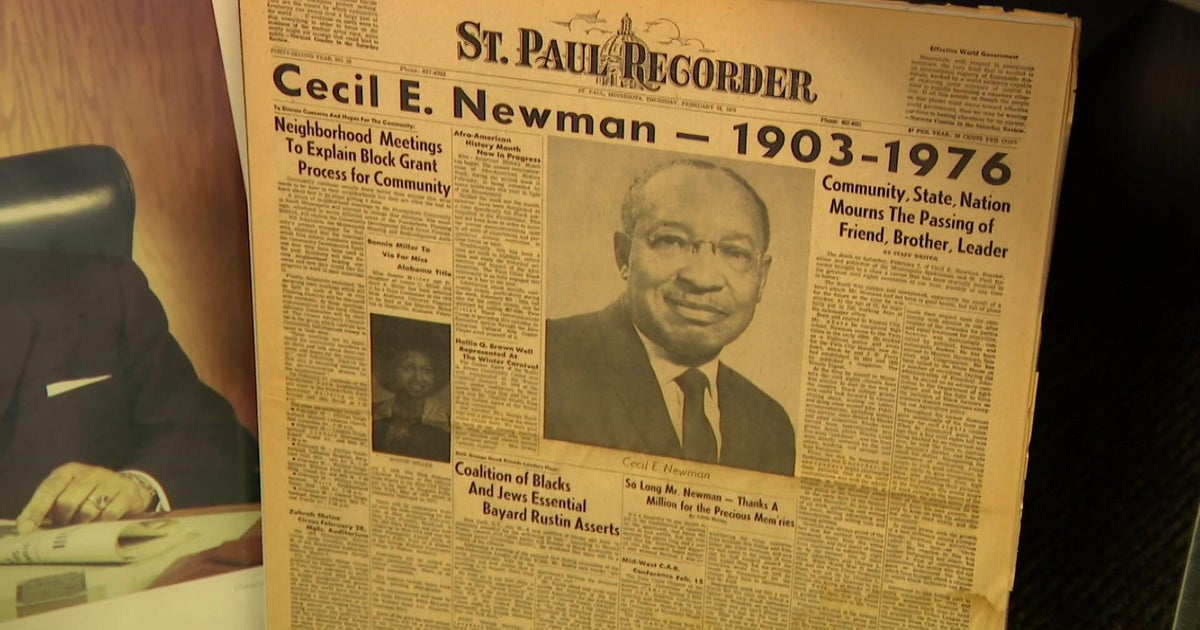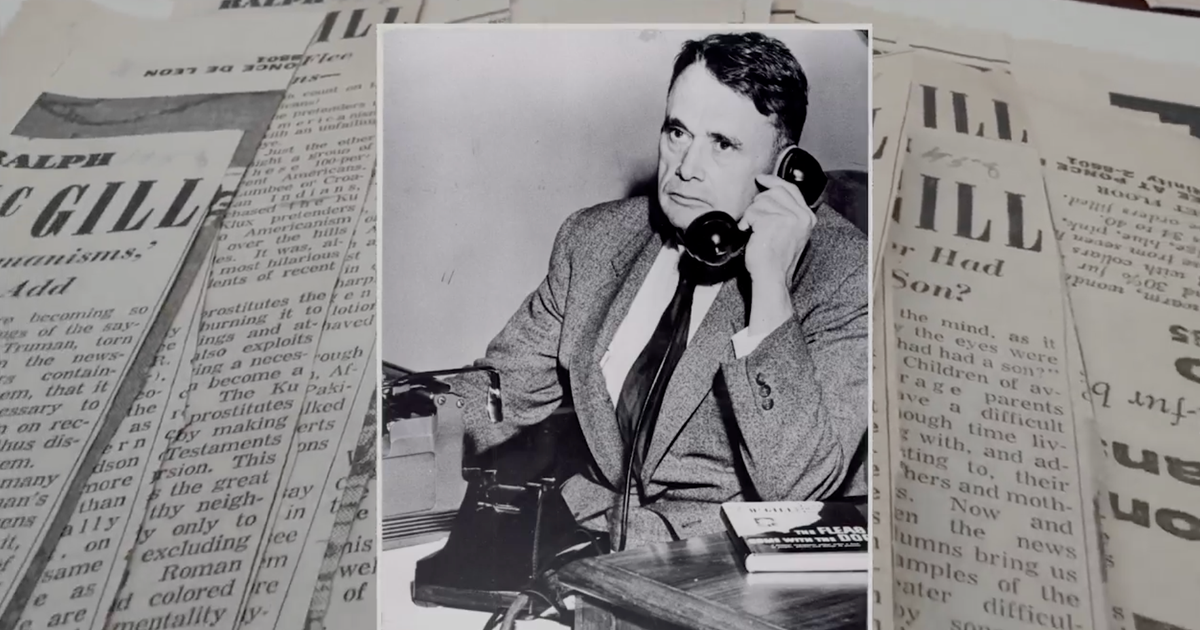Book about George Floyd wins Pulitzer Prize
MINNEAPOLIS -- A book about one of Minnesota's greatest tragedies and drivers for change is the newest winner of a Pulitzer Prize.
"His Name is George Floyd" chronicles the legacy of the man murdered by Minneapolis police officers back in 2020.
Written by Washington Post reporters Robert Samuels and Toluse Olorunnipa, it follows Floyd's life in the context of systemic racism and how his death sparked a global movement for justice and change.
RELATED: MPD settlement agreement approved, altering the future of policing in Minneapolis
The book won the 2023 Pulitzer for best nonfiction.
Former MPD officer Derek Chauvin -- who held his knee down on Floyd's neck for more than 8 minutes as shown in a Facebook Live video that quickly spread worldwide -- was convicted on two state murder charges and a manslaughter charge in April of 2021 and was sentenced to 22.5 years in prison. Chauvin appealed his conviction, but it was upheld by the Minnesota Court of Appeals last month.
The three other ex-officers involved – J. Alexander Kueng, Tou Thao and Thomas Lane – were all convicted of the state charges. All four men have already been convicted on federal civil rights violation charges. Chauvin was sentenced to 21 years; Kueng 3 years; Lane 2.5 years; and Thao 3.5 years. They will all serve their state and federal sentences concurrently.
RELATED: George Floyd killing: Roundup of all 4 former MPD officers' cases, outcomes
"His Name is George Floyd" is available everywhere books are sold.
Other awards
Of the two local reporting winners, Mississippi Today reporter Anna Wolfe's "The Backchannel" series detailed how state officials misspent millions in welfare money that was supposed to help some of the poorest people in the United States. In one case, Wolfe wrote about how former Gov. Phil Bryant and NFL legend Brett Favre worked together to channel at least $5 million of the state's welfare funds to build a new volleyball stadium at University of Southern Mississippi, where Favre's daughter played the sport.
The Associated Press won two Pulitzer Prizes for its coverage of the war in Ukraine, earning recognition for its breaking news photography of the Russian invasion, as well as the prestigious public service award for its startling — and exclusive — dispatches from the besieged port city of Mariupol.
AP journalists were also finalists in two Pulitzer categories, for breaking news photography of Sri Lanka's political crisis and for feature photography of the Ukraine war's impact on older people.
For the public service award, the Pulitzer judges acknowledged AP — which had the only international journalists in Mariupol for nearly three weeks — for capturing notable images of an injured, pregnant woman being rushed to medical help and Russia firing on civilian targets.
AP's Mariupol team was made up of videojournalist Mstyslav Chernov, photographer Evgeniy Maloletka and video producer Vasilisa Stepanenko on the ground in the besieged city, and reporter Lori Hinnant in Paris.
Other winners of two Pulitzers apiece were AL.com, of Birmingham, Alabama, the Los Angeles Times, The New York Times and The Washington Post.
The Pulitzers honor the best in journalism from 2022 in 15 categories, as well as eight arts categories focused on books, music and theater. The public service winner receives a gold medal. All other winners receive $15,000.
Kyle Whitmire, of AL.com, won a commentary award for "measured and persuasive columns" about Alabama's Confederate heritage and a legacy of racism.
His Alabama colleagues John Archibald, Ashley Remkus, Ramsey Archibald and Challen Stephens won a local reporting award for a probe into a local police force.
It was a second Pulitzer win for John Archibald, who previously won in 2018 for commentary, and the first for his son, Ramsey Archibald. Remkus and Stephens were also picking up their second Pulitzers, after being part of a team that won in 2021 for national reporting.
"The recognition is tremendous and we're grateful our work is being honored on the national stage like this," Kelly Ann Scott, editor in chief and vice president of Alabama Media Group, said in a statement. "This is local journalism at its best – and local journalism is the heartbeat of this country's journalism in general."
The New York Times was honored with an international reporting award for its coverage of Russian killings in the Ukrainian town of Bucha. Pulitzers were also given for work surrounding the U.S. Supreme Court's decision overturning the Roe v. Wade abortion standard, the government's policy of child separation at the border, and welfare spending in Mississippi.
The Washington Post's Caroline Kitchener won for "unflinching reporting" on the consequences of the abortion decision, including the story of a Texas teenager who gave birth to twins after new restrictions denied her an abortion. The Post's Eli Saslow won for feature writing.
The Los Angeles Times won for breaking news for its stories revealing a secretly recorded conversation with city officials making racist comments. The newspaper's Christina House won for feature photography, for her images of a 22-year-old pregnant woman living on the street.
The AP coverage of Mariupol, according to the Ukrainian city's deputy mayor, focused the world's attention on the devastation there and ultimately pressured Russians to open an evacuation route, saving thousands of civilian lives.
"They told the world of the human toll of this war in its earliest days," AP Executive Editor Julie Pace said during a staff Zoom celebration. "They served as a counterweight against Russian disinformation, and they helped open up a humanitarian corridor out of Mariupol with the power of their work."
The AP team that won for breaking news photography included Maloletka, who was part of the Mariupol coverage, along with Bernat Armangue, Emilio Morenatti, Felipe Dana, Nariman El-Mofty, Rodrigo Abd and Vadim Ghirda.
AP's director of photography, David Ake, credited winners in the breaking news photography category for simply staying put in a war zone to bear witness.
"You can't make the moment that captures the world if you're not there, and being there is often dirty and difficult and dangerous," he said.
Pulitzer Prize Board co-chair Neil Brown highlighted the dangers faced by journalists, noting the imprisonment in Russia of Wall Street Journal reporter Evan Gershkovich on spying charges, which his family and the newspaper vehemently deny. Brown said the board demands Gershkovich's immediate release.
The Atlantic won the Pulitzer for explanatory journalism for Caitlin Dickerson's exhaustive probe of the Trump administration policy of separating parents from children at the U.S. border.
The Wall Street Journal won for its investigation into federal officials holding stock that could have been affected by government action, including dozens who reported trading stock in companies shortly before their own agencies announced enforcement actions against them.
Andrew Long Chu, of New York magazine, won a Pulitzer for criticism. Nancy Ancrum, Amy Driscoll, Luisa Yanez, Isadora Rangell and Lauren Constantino, of the Miami Herald, won for editorial writing. Mona Chalabi, a contributor to The New York Times, won for illustrated reporting and commentary. The staff of Gimlet Media won for audio reporting.
The prizes were established in the will of newspaper publisher Joseph Pulitzer and first awarded in 1917.
List of winners in journalism, arts
PUBLIC SERVICE: Mstyslav Chernov, Lori Hinnant, Evgeniy Maloletka, Vasilisa Stepanenko, The Associated Press
The quartet of AP reporters won for what the Pulitzers described as "courageous reporting" from the besieged city of Mariupol about the slaughter of civilians in Russia's invasion of Ukraine. You can find a list of stories the team produced on our "Erasing Mariupol" page.
BREAKING NEWS REPORTING: The Los Angeles Times
The staff of the Los Angeles Times published a secretly recorded conversation among LA city officials that included racist comments, and then followed up with in-depth coverage of the aftermath.
INVESTIGATIVE REPORTING: The Wall Street Journal
The Wall Street Journal's "Capital Assets" series analyzed the investments of about 12,000 federal officials and their families between 2016 and 2021. The Journal collected and analyzed data on about 850,000 financial assets and more than 315,000 transactions. This was a staff award.
EXPLANATORY REPORTING: Caitlin Dickerson, The Atlantic
The Atlantic's Caitlin Dickerson conducted more than 150 interviews as part of an 18-month investigation into former President Donald Trump's "zero tolerance" policy of child separation at the border.
LOCAL REPORTING: John Archibald, Ashley Remkus, Ramsey Archibald and Challen Stephens, AL.com; Anna Wolfe, Mississippi Today
There were two winners; they don't share the category, but instead each receive the full prize amount of $15,000. The AL.com, Birmingham, reporters won for a series of stories exposing how the police force in the town of Brookside preyed on residents to inflate revenue. The reporting freed people from jail, the outlet says, and resulted in resignations and new laws.
NATIONAL REPORTING: Caroline Kitchener, The Washington Post
Caroline Kitchener of The Washington Post wrote about the consequences of life after the Supreme Court ruling that overturned Roe v. Wade, including stories about women trying to navigate the aftermath.
INTERNATIONAL REPORTING: The New York Times
The staff of The New York Times won for their coverage of Russia's invasion of Ukraine, including an investigation into Ukrainian deaths in the town of Bucha.
FEATURE WRITING: Eli Saslow, The Washington Post
Eli Saslow won for what the Pulitzers called "evocative individual narratives" about people struggling with the pandemic, homelessness, addiction and inequality in the United States. Saslow has since left the Post, joining The New York Times in February. According to the Times announcement, he had been a finalist in this category thrice before and had previously won a Pulitzer for explanatory reporting.
BREAKING NEWS PHOTOGRAPHY: The Associated Press
A team of AP photographers won the Pulitzer for "unique and urgent" images of the first weeks of Russia's invasion of Ukraine.
While it was a staff award, AP CEO Daisy Veerasingham wrote that the prize is shared among Rodrigo Abd, Bernat Armangue, Felipe Dana, Nariman El-Mofty, Vadim Ghirda, Evgeniy Maloletka and Emilio Morenatti. See a photo gallery of their work here.
FEATURE PHOTOGRAPHY: Christina House, Los Angeles Times
Christina House of the Los Angeles Times won for "an intimate look" into the life of a pregnant 22-year-old woman living on the street in a tent. It was part of a series called "Hollywood's Finest," a look at the lives of three women without housing.
COMMENTARY: Kyle Whitmire, AL.com
Kyle Whitmire of AL.com, Birmingham, won for "State of Denial," a series of what the Pulitzers called "measured and persuasive columns" that documented how Alabama's Confederate heritage still lingers.
CRITICISM: Andrea Long Chu, New York magazine
Andrea Long Chu of New York magazine won for book reviews that employ "multiple cultural lenses" to explore societal issues, the Pulitzers said.
EDITORIAL WRITING: Nancy Ancrum, Amy Driscoll, Luisa Yanez, Isadora Rangel and Lauren Costantino, Miami Herald
The Miami Herald writers won for "Broken Promises," a series of editorials on the failure of Florida public officials to deliver on taxpayer-funded amenities and services long promised to residents.
ILLUSTRATED REPORTING AND COMMENTARY: Mona Chalabi, The New York Times
New York Times contributor Mona Chalabi won for illustrations that combine statistical reporting with analysis to help readers understand the immense wealth and economic power of Amazon founder Jeff Bezos.
This prize replaced the editorial cartooning award last year, right on the heels of Pulitzer judges declining to name an editorial cartooning winner in 2021.
AUDIO JOURNALISM: Gimlet Media, notably Connie Walker
The award went to the staff of Gimlet Media, notably Connie Walker, whose "Stolen: Surviving St. Michael's" investigation into her father's troubled past revealed a larger story of abuse of hundreds of Indigenous children at a residential school in Canada.
FICTION: "Demon Copperhead" by Barbara Kingsolver; "Trust" by Hernan Diaz
The two novels each won the fiction prize. "Demon Copperhead" is what the Pulitzers called a "masterful recasting of 'David Copperfield,'" set in Appalachia. The citation described "Trust" as "riveting" and "a complex examination of love and power in a country where capitalism is king."
DRAMA: "English" by Sanaz Toossi
Sanaz Toossi's "English" is a "quietly powerful play," the Pulitzers said, centered on four adults preparing for an English exam near Tehran, Iran. The classroom drama explores the ways in which language shapes identity, experience and a sense of belonging in the world.
According to the Pulitzer website, the jury for this prize attends plays in New York and in regional theaters – while the award goes to the playwright, the actual productions of the shows are factored in.
U.S. HISTORY: "Freedom's Dominion: A Saga of White Resistance to Federal Power," by Jefferson Cowie
Jefferson Cowie won the history prize for a book that the Pulitzers describe as a "resonant account of an Alabama county in the 19th and 20th centuries shaped by settler colonialism and slavery" that illustrates the evolution of white supremacy.
Generally speaking, this is the only arts and letters — books, music, drama — award that can be awarded to someone who isn't a U.S. citizen (but the book must be a history of the U.S.).
GENERAL NONFICTION: "His Name Is George Floyd: One Man's Life and the Struggle for Racial Justice," by Robert Samuels and Toluse Olorunnipa
The book by two Washington Post reporters is what the Pulitzers called an "intimate, riveting portrait" of George Floyd, the man whose murder by Minneapolis police officer in 2020 sparked an international racial justice movement. The Pulitzer board moved it from the biography category, a release says.
BIOGRAPHY: "G-Man: J. Edgar Hoover and the Making of the American Century," by Beverly Gage
The prize was awarded to the "deeply researched and nuanced" biography of longtime FBI director J. Edgar Hoover, per the citation.
MEMOIR OR AUTOBIOGRAPHY: "Stay True" by Hua Hsu
Hua Hsu's memoir won this category for "an elegant and poignant coming of age account," the Pulitzers said.
POETRY: "Then the War: And Selected Poems, 2007-2020," by Carl Phillips
Carl Phillips' poetry won for what the Pulitzers called "a masterful collection that chronicles American culture."
MUSIC: "Omar," by Rhiannon Giddens and Michael Abel
"Omar" is an innovative and compelling opera about enslaved people brought to North America from Muslim countries," the Pulitzers said. It premiered last May at the Spoleto Festival USA in Charleston, South Carolina.
To award the musical competition prize, the website says the jury convenes in New York to listen to recordings and study the scores.







